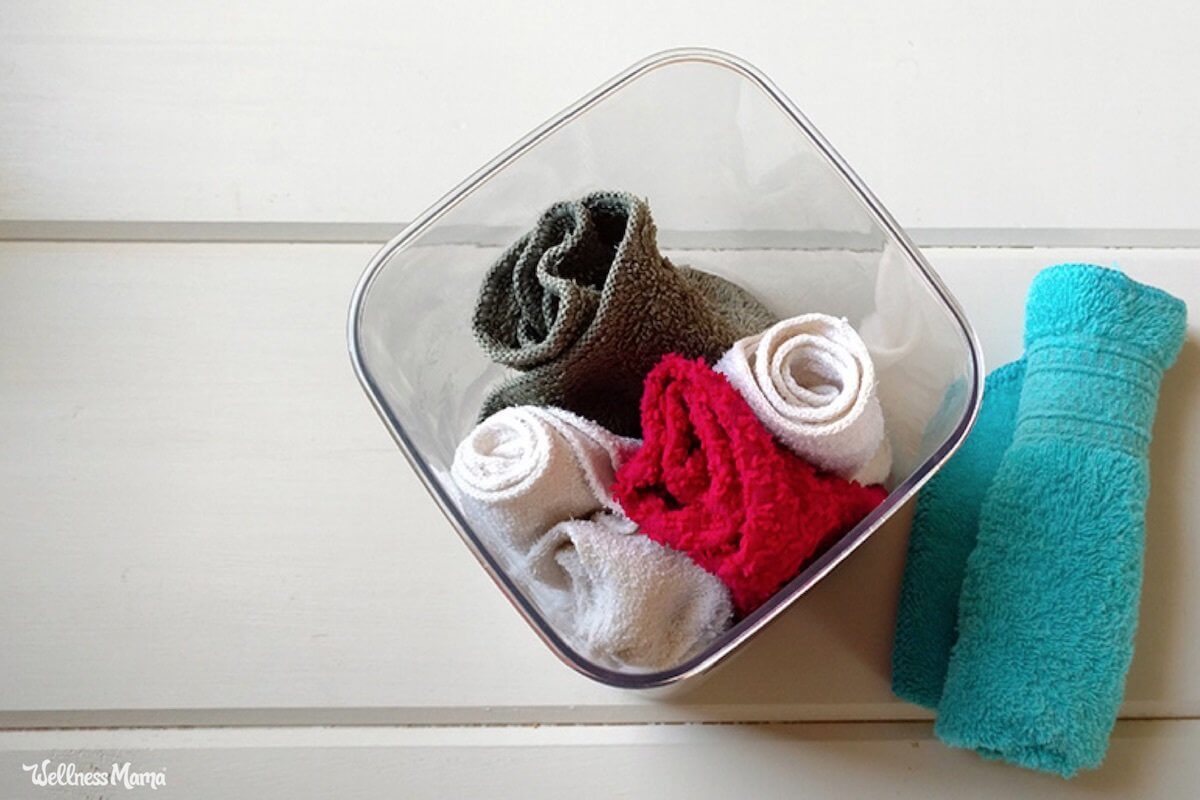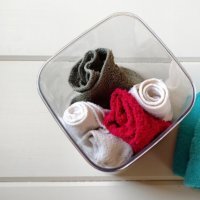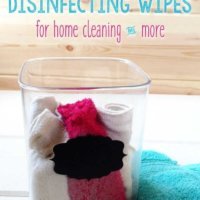Those ready-made disinfecting wipes in the plastic containers can be so convenient for sanitizing and eliminating messes. Our family doesn’t use toxic conventional cleaners, and with a large family the cost of natural store-bought cleaners adds up fast. These natural disinfecting wipes are super simple to throw together and are a safe, effective solution to clean surfaces around the home.
Disinfecting Wipes With Essential Oils
Many of my cleaning products (and beauty products) contain essential oils. When used properly, they can be potent germ killers that are still safe to use around little ones. According to my research, all essential oils are anti-microbial to some degree, but lemon and tea tree are particularly effective. Both of these oils have a wide degree of safety for all ages when used as a surface cleanser. When these essential oils are combined, they may provide powerful protection against a wide array of pathogens, including potentially E. coli, MRSA, and salmonella.
Soap Is Safer
The 2013 FDA decision to ban several antibacterial soap ingredients caused quite a stir! Their decision was based on a lack of evidence for the long term safety of these antibacterial substances. In collaboration with the EPA, they also found some potential risks of these chemicals.
The official release also stated that evidence shows that at least for hand washing, plain soap and water is as effective as antibacterial soap when used correctly.
Of course, disinfecting surfaces is important, especially when it comes to surfaces touched by raw meat. Other types of household cleaning also require a little more power than traditional soap and water. Still, to respect the levels of healthy bacteria in our home, I use any disinfectant sparingly.
Castile Soap and Vinegar Are Not Friends
I’m a big believer in the power of vinegar. A lot of cleaning recipes use vinegar as a disinfectant, but vinegar and soap do not mix when it comes to cleaners. Since this recipe for natural disinfecting wipes also uses castile soap to break down greasy residues, vinegar won’t work here. (Lisa Bronner, from the Dr. Bronner soap family, spells out why vinegar and soap don’t work together as a cleaner in this article.)
Alcohol: Not Just for Drinking
Since there’s no vinegar in this recipe, alcohol serves instead as a disinfectant and degreaser. Alcohol evaporates quickly, allowing the cleaning solution to dry fast. (Certain rooms, like bathrooms, benefit from a fast-drying cleaner to help prevent mildew growth due to wet surfaces).
Many people have isopropyl or rubbing alcohol around, but this recipe calls for another kind of alcohol… vodka!
Natural Disinfecting Wipes Recipe
Equipment
Materials
- ½ cup vodka (NOT rubbing or isopropyl alcohol)
- 3 TBSP castile soap
- 1½ cups distilled water
- 30 drops tea tree essential oil
- 35 drops lemon essential oil
Instructions
- In the large bowl mix together the alcohol, soap, water, and essential oils.
- Place two of the washcloths or fabric squares into the glass container, then pour about 1/3 of the cleaning solution over them.
- Repeat this process until all of the cloths and solution has been used. (This approach guarantees evenly wet wipes.)
- Put the lid on the container and move the container around, tipping it upside down and back again to make sure the cloths are fully saturated.
How to Use:
- Remove a wipe from the container, and wring any excess liquid out over the other wipes. Use it to disinfect and clean surfaces around the house.
- Since these natural disinfecting wipes are sturdier than the store-bought disposable ones, they hold up to scrubbing surfaces much better.
- Test any new surfaces in an inconspicuous location if there’s any concern the wipe could damage the material or surface to be cleaned.
Notes
- To wash: Launder with other kitchen towels. I always keep a small laundry basket on hand in my pantry for towels and wipes. I wash them together in hot water with a splash of hydrogen peroxide and regular laundry detergent.
- I am comfortable using these and have never had a problem using natural disinfectants like this. Please note that these are not broad spectrum disinfectants like those used in hospitals and should not be treated as such. This recipe is designed for household use and not as disinfecting wipes for skin.
Other Natural Disinfectants to Keep on Hand
These wipes are my go-to cleaners for most kitchen messes. I also keep white vinegar and hydrogen peroxide on hand for big kitchen messes.
White Vinegar
Vinegar is used in food preservation for a reason: it inhibits bacterial growth. It isn’t technically a disinfectant, but it is an effective degreaser that has some antibacterial power too. I keep a bottle of white vinegar in a spray bottle in our kitchen for use on sticky messes, grease, and sometimes as a first pass on raw meat before using these wipes.
Hydrogen Peroxide
Another natural disinfectant that I keep in the kitchen is hydrogen peroxide. I add a spray bottle top to a regular hydrogen peroxide bottle and use this to disinfect cutting boards and raw meat dishes before washing them regularly. We use food-grade hydrogen peroxide to keep our pool clean without chlorine too! Now that I keep this 35% food grade peroxide on hand, I can make a stronger concentration for use in the kitchen. Just make sure to always store hydrogen peroxide in a dark-colored opaque bottle to keep it from breaking down in light.
This article was medically reviewed by Dr. Shani Muhammad, MD, board certified in family medicine and has been practicing for over ten years. As always, this is not personal medical advice and we recommend that you talk with your doctor or work with a doctor at SteadyMD.
What are your favorite natural cleaning tips? Are natural disinfectants part of your routine? Let me know!




Leave a Reply